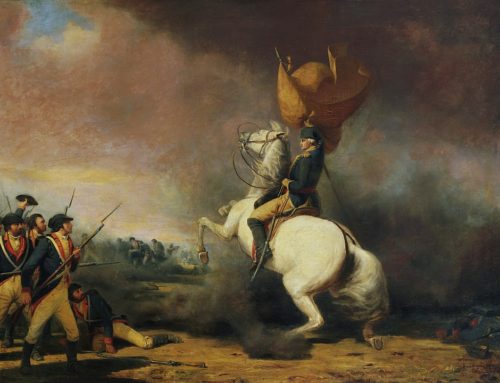The United States must “act for us and not for others.”
Several years ago, I wrote about Washington’s Farewell Address, which was written in a prominent Philadelphia Newspaper and not delivered.
I did not think much further about this famous communication, until I read a book called Founding Fathers. The author highlighted some issues that I feel deserve mention. In a nutshell, Washington’s farewell address served as a cornerstone of American foreign policy until World War I.
First of all, George Washington was a pragmatic realist who recognized that America’s top priority was to expand westward to the Pacific Coast if we were going to secure the safety of the original thirteen colonies that were located along our eastern seaboard.
Secondly, he felt America needed at least twenty years of further development to secure our future as an independent nation. Otherwise European powers like France, England, and Spain would not only stifle our western expansion, but even carve up the new American nation. Thus, Washington urged a neutral policy toward Great Britain and France rather than form an alliance with these formidable European powers. Stated differently, Washington knew that a peacetime America could attract highly motivated immigrants from Europe provided we were not ensnared in costly military wars, particularly when the combatants were European powers fighting over control of the European continent.
Thirdly, Washington distrusted the motivations of any great power. That is, while he appreciated France and Spain’s help during our war of independence, he recognized that all countries first priority is to prioritize their own domestic and foreign agendas. Thus, Washington realized that a neutral policy would best serve our country.
Fourthly, Washington felt that America should focus on our own hemisphere rather than Europe. In essence, his policies anticipated the formal adoption of the Monroe Doctrine in 1819. This doctrine had two major points: 1) America would oppose further colonization of the New World and 2) America would stay maintain an isolationist policy in respect to Europe.
Fifth, Washing was against the formation of political parties to advance a particular position. He favored compromise and conciliation rather than the emergence of a political party that demanded the adherence of its members above the needs of the State.
As I stated earlier, in essence, Washington’s farewell address was the cornerstone of American foreign policy until our entry into World War I.
George Washington wrote his farewell address for several purposes: (1) eliminate himself as a candidate for a third term, (2) express his opposition to entangling foreign alliances (3) state his concern about the formation of political parties. (4) Formally rebut critics of the Jay Treaty who preferred America stay allied with Napoleonic France.
Washington recognized that his acceptance of the Presidency was important in drawing the disparate colonies into a shared national consciousness, but also recognized that a two-term limit would encourage a democratic, not monarchal tradition. “I have the consolation to believe that, while choice and prudence invite me to quit the political scene, patriotism does not forbid it.” King George III, a longtime antagonist of George Washington, was greatly impressed by Washington’s voluntary relinquishment of power. George III even stated that George Washington was indeed a great man. Given that Washington led our revolution, it is startling that George III could appreciate Washington’s adherence to democratic ideals.
Washington’s Farewell Address was never spoken. Instead, it was printed in Claypool’s American Daily Advertiser, Philadelphia-the temporary capital of the United States. The Address quickly entered into the realm of revealed truth. Many Americans in subsequent generations accepted Washington’s advice as gospel. In any debate between neutrality and involvement in foreign issues, Americans would invoke Washington’s farewell address as the ultimate guide. Not until 1949 when the United States joined NATO did the United States sign a peacetime treaty of alliance with a foreign nation or nations.
The address was in two parts. In the first part, Washington declined a third term, gave his reasons, and acknowledged a debt of gratitude for the honors conferred upon him and for the confident support of the people. In the second part, he presented his thoughts about the government.
Washington, like many of his contemporaries, did not understand or believe in political parties. He was concerned that political parties would undermine allegiance to American principles. He feared political parties that owed special regional or economic alliances. When political parties began forming during his administration, and in direct response to some of his policies, he failed to comprehend that parties would be the chief devices through which the American people would debate and resolve major public issues. It was his fear of what parties would do to the nation that led Washington to draft his farewell address. “Let me now take a more comprehensive view, and warn you in the most solemn manner against the baneful effects of the spirit of party generally. It serves always to distract the public councils and enfeeble the public administration.”
The two parties that developed in the early 1790s were the Federalists who supported the economic and foreign policies of the Washington administration, and the Jeffersonian Republicans, who in large measure opposed them.
The Federalists backed Secretary of the Treasury Alexander Hamilton’s plan for a central bank and a tariff and tax policy that would promote domestic manufacturing. Alexander Hamilton, our first Secretary of the Treasury, did an admirable job of putting the country on a sound fiscal basis. He recognized that a prosperous America would stimulate a national democratic consciousness. His fiscal policies appeared to favor the manufacturing interests of New England and New York.
Moreover, the Federalists supported the Jay Treaty, a controversial treaty with Great Britain. This treaty entailed compromises by both Great Britain and the United States. The treaty assured peace between these two nations until 1812, a welcome respite for the young nation.
The Jeffersonians opposed the strong government inherent in the Hamiltonian plan, and favored farmers as opposed to manufacturers. The Jeffersonian Republicans appealed to the South a region that was primarily agricultural. The tariffs proposed by Hamilton not only favored domestic manufacturing, but also were a financial burden to farmers.
In foreign affairs, both sides wanted the United States to remain neutral in the growing controversies between Great Britain and France, but the Federalists favored the English and the Jeffersonians the French. The Address was Washington’s response to his critics who bitterly denounced his desire for neutrality rather than supporting France, our wartime ally. Stated differently, Washington feared France under Napoleon as much as he feared Britain under George III. For example, Washington did not want France to attack Canada, because he feared that the large Canadian French population would support France and overthrow British rule. Washington feared that a French Canadian presence would be a springboard for further encroachments by France in North America.
Two-thirds of the Address devoted to domestic matters, and the rise of political parties. Washington set out his vision of what would make the United States a truly great nation. He called for men to put aside party and unite for the common good, an “American character” wholly free of foreign attachments. The United States must concentrate only on American interests and while the country ought to be friendly and open its commerce to all nations, it should avoid become involved in foreign wars.
Washington did not call for isolation. Instead, he wanted to avoid entangling alliances. The United States must “act for ourselves and not for others.” “Nothing is more essential than that permanent, inveterate antipathies against particular nations … should be excluded, and in place of them just and amicable feelings toward all should be cultivated…. So, likewise a passionate attachment of one nation for another produces a variety of evils.”



